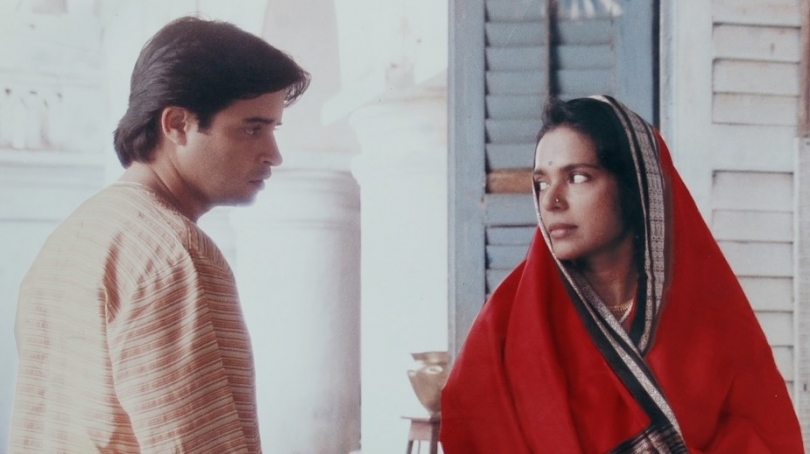|
|
||
|
Pro Tools
FILMFESTIVALS | 24/7 world wide coverageWelcome ! Enjoy the best of both worlds: Film & Festival News, exploring the best of the film festivals community. Launched in 1995, relentlessly connecting films to festivals, documenting and promoting festivals worldwide. Working on an upgrade soon. For collaboration, editorial contributions, or publicity, please send us an email here. User login |
Bijaya Jena’s Hindi film ‘Abhaas’ (1997): An Overlooked Indian ClassicBabu Subramanian
Akshay Anand and Bijaya Jena in Abhaas The Hindi film Abhaas (Prologue) – about to enter its silver jubilee year in 2022 - is among the Indian art films which have aged well. It was directed by the FTII trained actor Bijaya Jena who also starred in it. Her first feature Tara (1992), a national award winning Odiya film, is about the journey of a woman in a men’s world which leads her to finding her calling. Jena acted as well as wore the director’s hat in it too. Abhaas has a woman impacted by zamindari as one of the main characters. Based on the short story by Rabi Das, the script for the film was written by Bijaya Jena with the distinguished Hungarian filmmaker István Gaál– known for films such as Current (1963) and The Falcons (1970) - as the script advisor. Cinematography is by the FTII trained Neelaabh Kaul who shot Jena’s Tara too. Volker Schlöndorff called Abhaas a beautiful film and he added that “the casting is impeccable, as is the direction of the actors and the pacing, setting and photography. Simply wonderful, quiet and sovereign”. It is surprising that such a film has been largely overlooked. In 1997, it didn’t get selected for the Indian Panorama of films which are screened during the Indian film festival (IFFI). Nor it won awards in India and abroad. It was shown in some of the film festivals: viz. Cairo, Montréal, La Rochelle, Penang and Sochi. At Cairo it was nominated for the Golden Pyramid award. This recently restored film is the kind that cinephiles would like to catch up with in the classics section in film festivals such as Cannes, Berlin and Venice. It’s rewarding to analyze Abhaas to figure out its qualities which are worthy of its restoration.
Ashima Singh and Murali in Abhaas Abhaas is set in the giant mansion of a zamindar Shyam Sundar Ray (Murali). Like the palace in Satyajit Ray’s masterly film Jalsaghar, in Abhaas also the mansion plays an important part in the film. There is an army of servants who keep cleaning it. The tenant peasants report regularly on the cultivation made by each one of them. An obedient bookkeeper (Uday Chandra) takes care of Ray Sahab’s interests. Somewhere in the early part of Abhaas there is a scene in which a homa (fire ritual) is performed. The faces of the key characters – Ray Sahab, Kokila Naik (Bijaya Jena) and Chandrashekhar Ray (Akshay Anand)- are shown with the flame in the foreground. It forebodes the tragedy that is going to befall Kokila and others. Chandra is a relative of the landlord Ray who has been raised by the Ray family. Kokila is yet another relative who has been taken by the Ray household after her husband passed away. Ray appears to be somewhat progressive in the beginning in overruling the priest’s objection to the widow Kokila attending the homa. Ray also has her educated in English by a tutor. There is a budding romance between Kokila and Chandra which is ruined by Ray’s advances towards her. Sheltered by the Ray family, Kokila and Chandra are unfortunately like the land owned by the family and vulnerable to be controlled by it. Land is a recurring theme in the film. Ray has an illicit sexual relationship in secret with Kokila who submits to him due to her dependence on him. When she is pregnant, she is made to undergo an unsafe abortion performed by a village midwife which causes her death. Ray’s liberal streak gives way to passing the blame on Chandra for protecting himself.
Bijaya Jena in Abhaas Murali as Ray Sahab has given an excellent performance which has been commended by India’s leading filmmaker Adoor Gopalakrishnan. Calling Abhaas a quiet film, impressive in its persuasive charm and unhurried in pace and perceptive in treatment, Adoor goes on to say, “One of the strengths of the film is actor Murali’s performance in the role of the master of the house who is persecuted by an obsessive sense of guilt to which he eventually succumbs.” Bijaya Jena also has come up with a stunning performance as Schlöndorff has observed although her role is mostly limited to the first half of the film. Later, seated in a boat as a ghost when Ray runs towards her in his dream, the way she turns and looks at him is haunting. The poetry of the idealistic Chandra is a counterpoint to the misfortune of the key characters. Akshay Anand has given a memorable performance in the role of an idealist which has the danger of appearing clichéd if not done well. There are the charming early scenes in which Kokila and Chandra take Ray’s grandson Rabi (Asif) to the fair to see the folk dance and the waterfalls where Chandra breaks out into reciting poetic lines to the liking of Kokila. After her death, despite knowing that Ray is passing the blame on him, he remains silent. He doesn’t go against Ray who raised him. People have seen him and Kokila going out so their evidence is stacked against him. Perhaps he also partly feels for not going away with Kokila which could have prevented her death. He accepts his imprisonment philosophically. In the closing part the film moves away from Ray’s mansion. The breathtaking shots of the field and the river make a fitting end for Abhaas which finds transcendence in this tragedy of zamindari. 21.07.2021 | Babu Subramanian's blog Cat. : #classicmovies 1997 Abhaas Bijaya Jena Cairo color feature film hindi india la rochelle montréal Nominated for the Golden Pyramid award at Cairo Penang
|
LinksThe Bulletin Board > The Bulletin Board Blog Following News Interview with EFM (Berlin) Director
Interview with IFTA Chairman (AFM)
Interview with Cannes Marche du Film Director
Filmfestivals.com dailies live coverage from > Live from India
Useful links for the indies: > Big files transfer
+ SUBSCRIBE to the weekly Newsletter Deals+ Special offers and discounts from filmfestivals.com Selected fun offers
> Bonus Casino
About Babu Subramanian Subramanian Babu Subramanian Babu Babu Subramanian is a film critic based in Bangalore. He co-founded "Deep Focus" the pioneer film quarterly in India. He is a member of the Film Critics Circle of India. View my profile Send me a message The Editor |

























